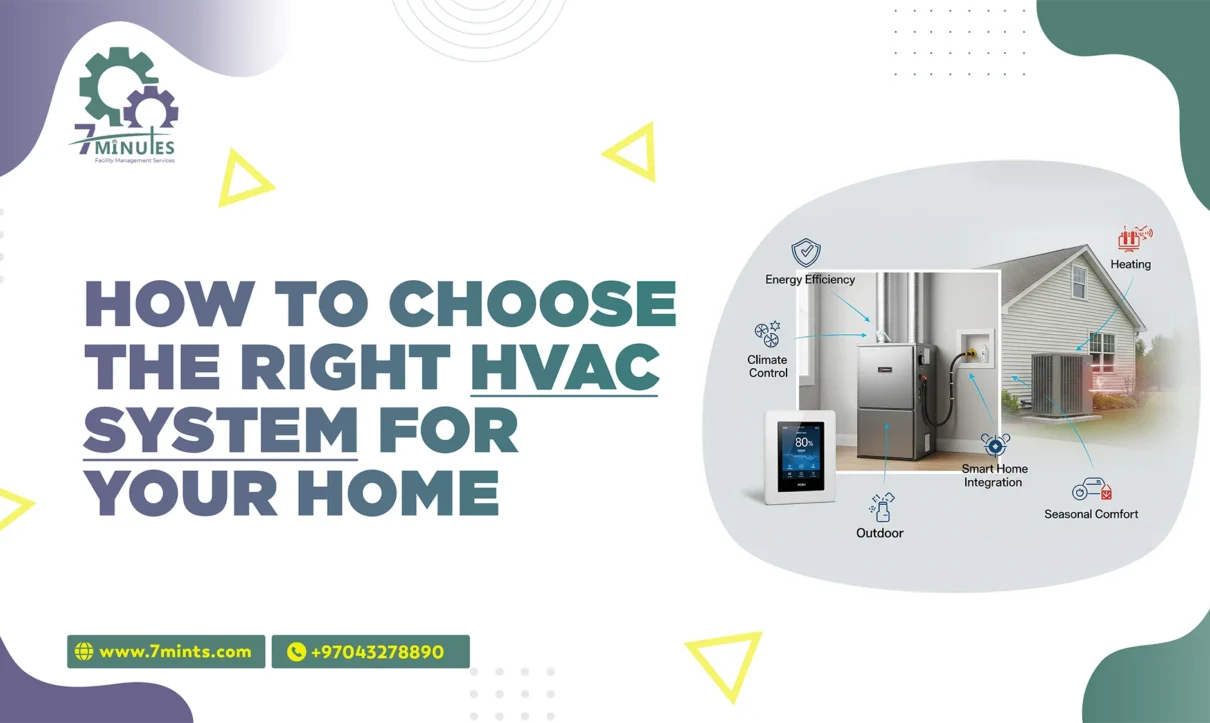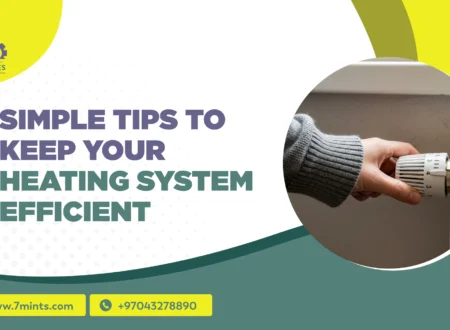Choosing an HVAC system for a home is one of the major decisions for every homeowner. The right system can keep your family comfortable all year, even help in reducing energy bills, and perhaps improve the home’s air quality. More and more options and technologies just add to the confusion. Comprehensive assistance on factors to consider, types of systems, and recent trends will help with making the correct decision confidently.
Identify Heating and Cooling Needs of the House
Before heading for purchase, it is important to know the peculiarities of the home. Each house will have its considerations depending on size, layout, insulation, and climatic conditions.
Calculate Load Requirements
Professional HVAC contractors take load calculations to size the system suitable for the home. This calculation considers the square footage of the house, insulation, number of windows, and sunlight coming in through each window in every room. A system large in size will be turning on and off too frequently, therefore wasting energy and causing premature wear and tear of parts, while small systems will have difficulty keeping up with comfort levels and thus uneven temperatures and more bills. Properties of the best calculation are comfort and efficiency.
Consider Zoning Needs
If your home is multi-story or different areas heat up and cool down at varying rates, a zoned HVAC system changes the whole equation. Zoning allows the independent control of temperatures in various locations so you may cool down bedroom areas at night or not heat rooms in use in the daytime. This facilitates comfort and energy efficiency by conserving unnecessary heating or cooling.
Evaluate Existing Infrastructure
Take stock of the home’s current setup. Are the ductworks in perfect condition, or are you looking at a ductless system for easier installation? An older home without ducts would perhaps benefit best from a ductless mini-split system, whereas well-built ducts become equally good candidates for central air. The condition and layout of a home infrastructure may stand in the way of cost considerations and implementation.
Comparing Different HVAC Systems
Among the main HVAC system types lies the pros and cons pertinent to each, giving you insight on how best to select for your home and lifestyle.
Split Systems
The system usually consists of an outside unit (air conditioner or heat pump) and an inside unit (furnace or air handler). The split system is best for those homes that have space for ductwork and require heating and cooling. They are very reliable and allow the use of smart thermostats for finer control.
Ductless Mini-Split Systems
Ductless mini-splits fit houses that either lack existing ductwork or do some thermoregulating in just a few selective rooms. One inside unit is provided for every single room or zone, typically offering discrete temperature control and energy savings. Owing to their being efficient yet simple to install, the system is a good option for renovations and additions; however, they generally have a high first cost, and importantly, the indoor units have to be cleaned very often.
Geothermal System
Geothermal systems take advantage of the relatively stable temperature of the Earth to heat and cool a house. Being the most efficient type of system, it charges very low operation costs and enjoys the longest lifespan. And while installation costs are high and sufficient land area is required for laying ground loops, green operation and long-term savings might well make a geothermal system an investment worth making for an interested homeowner.
Packaged HVAC Unit
Packaged units combine heating and cooling components inside a single cabinet, installing such cabinets mostly outside or atop rooftops. This is ideal when interior space is lacking and comes with the advantage of all-in-one convenience. Repair work can be tricky, though, and upfront costs can well exceed those of split systems.
Energy Efficiency Considerations
Energy efficiency is perhaps the number one concern for any homeowner because it will directly affect utility bills and environmental concerns.
Look for High SEER, HSPF, and AFUE Ratings
The cooling efficiency of an air conditioning system is rated by the experiments, or seasonal energy efficiency ratio (SEER), and the heating efficiency rating is expressed as the heating seasonal performance factor (HSPF) or annual fuel utilization efficiency (AFUE). In measuring these parameters, the higher the rating, the better its performance, and hence the lower will be the energy cost incurred; hence, it should always be compared when looking at systems.
Pick ENERGY STAR®-Certified Models
ENERGY STAR® systems are HVAC systems that meet the sophisticated efficiency parameters laid down by the government. Systems of this kind may also become eligible for some rebates and incentives on purchase, saving you a little immediately and throughout the life of the system. Check out our latest blog post on Different Types of Electrical Wiring Systems for Residential Buildings
Smart Thermostats and Controls
In most HVAC systems today, a smart thermostat is installed so that it learns your daily schedule and adjusts the settings for you. The controls will save energy by lowering heating or cooling when the residents are away or asleep. Some of these can also allow remote control via a smartphone interface, which is not just a nice feature but also contributes to further savings.
Consider the Climate and Size of the House
Learning about your location’s weather and having the size of your house in consideration would hugely help you make the right choice for an HVAC system.
Hot Climate
Climate scenarios
Instances of hot summer days really demand the might of some air conditioning system or a heat pump designed for cooling efficiency. Look for systems with a high SEER rating and features such as variable speed compressors for maximum comfort and efficiency.
Cold Climates
A house in cold regions may indeed require a heating system with much stronger heating capabilities like furnaces or dual-fuel heat pumps. A geothermal system functions excellently in colder climates, providing steady heating without eating up loads of energy expenses.
Moderate Climates
For areas with moderate climates, a flexible system that can treat or cool depending on the season can be the best choice. They offer the highest level of comfort all year round and are usually the most energy-efficient in moderate climates.
House Size/Layout
Larger homes may require systems more powerful or more zones to ensure even temperature function. Open floor plans with high ceilings and walls of glass can also determine heating and cooling needs. Anyhow, work together with a professional for the right sizing of the system for your home.
Explore Features and Trends of Today in the Industry
The HVAC industry is evolving rapidly day by day, and with new features, you can make your system smarter, more efficient, and healthier for your family.
Smart HVAC System
With remote monitoring, automated diagnostics, and user-specific settings, HVAC systems enhanced with AI and IoT provide an introduction to these technologies. Smart home integration allows for the most minute control and efficiency. Voice command, learning algorithms, and a mobile application are a few of the features that allow comfort to be anywhere of your choice.
Indoor Air Quality (IAQ) Innovations
Today, the systems may take high-grade air filtration, UV-C light disinfection, and smart ventilation into account. Every other way to purge the environment of allergens, bacteria, and pollutants for a healthier indoor environment is featured. For homes with allergy or respiratory issues present, do look for those systems with enhanced air quality features.
Environmentally Friendly Refrigerants
The industry is working away from refrigerants considered to have high global warming potential (GWP), such as R-410A, and switching instead to their environment-friendly counterparts like R-32 and R-454B. By opting for a system so equipped with sustainable refrigerants, you ensure that you lessen your environmental impact while remaining compliant with future laws.
Installation and Maintenance: Cut No Corners
Proper setup, along with constant repair, is paramount to how a system performs and how long it lasts.
Choosing an Installer
Upon discussing the complete evaluation with a local contractor who is licensed and experienced, the contractor will prescribe the best system for your home, with the installation, which will ensure suitability. Monitoring points in the performance, evaluating safety, checking out the permits, and other affairs concerning installation with the optimum condition-management performance are usually handled by an expert. If installation is done poorly, it can cause inefficiency, frequent breakdowns, and even safety issues.
Maintenance Requirements
Ask about maintenance for various systems—filter changes, inspections, and tune-ups. Regular maintenance can maintain the lifetime of your HVAC system, improve efficiency, and avoid costly repairs. Some systems demand attention more often than others, so keep that in consideration.
Warranty and Support
Examine warranties on parts and labor prior to purchasing. A good warranty creates a sense of security and protects your investment in the event something goes wrong. Also, check out whether the manufacturer or installer offers support or service plans to ensure your system stays operational.
DIY Maintenance Tips
Changing the filter regularly, making sure the outdoor units are clear of debris, and setting your thermostat with efficiency in mind—a few tips could save you. Do not close the vents in unused rooms, as the system efficiency will get hampered. Another suggestion is installing a whole-house fan down the road for some more energy savings and air movement.
Budget, Financing, and Incentives
Upfront cost versus long-term savings needs to be weighed when choosing HVAC systems.
Compare Upfront Costs and Long-Term Savings
Depending on how energy efficient a system is, it may have a higher purchase price or upfront investment, but eventually, these systems pay off because they hold well to a low energy cost profile. Total cost of ownership includes installation, operation, and maintenance. It always pays to put in more now to save big later.
Explore Financing Options
Many manufacturers and HVAC companies will have financing arrangements that make system upgrades affordable. Look for low-interest or zero-interest promotional periods with monthly installments that are reasonable and pay plans without steep upfront deposits. This gives you multiple options to enhance your comfort without budget constraints.
Avail Rebates and Tax Credits
Typically, energy-efficient systems secure rebates and tax credits. In regard to heat pumps, they may qualify for federal tax credits up to $2,000, while high-efficiency furnaces and air conditioners could fetch $600; local utility companies might offer rebate programs or special financing for energy-efficient upgrades – give your installer a call to find out.
Conclusion
Choosing the right HVAC system for your home is, in effect, a personal act of investing in comfort, health, and, somehow, energy savings. Through a careful consideration of your generally felt needs and requirements, a comparison of the latest available options, and working with trusted professionals, you can bask in comfort throughout the ages with a peaceful mind. Would you be so kind now as to contact us if you decide to have your home comfort systems upgraded or would like expert advice on what sits best on an HVAC system basis for your needs? Our team will take you by the hand from the assessment process to the installation process, and finally to support. Invest in the smart side of choices for the present and the future of your family!










1 Comment
Comments are closed.